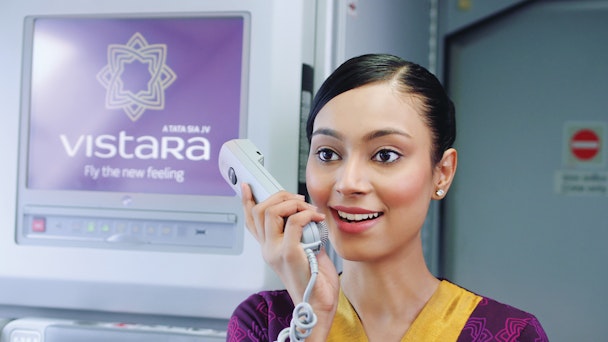Tata-owned airline Vistara reveals its plan to lure travellers back to the skies
Deepak Rajawat, chief commercial officer of Vistara, speaks to The Drum for an exclusive peep into the playbook of the full-service air carrier, as it looks to take advantage of the post-Covid travel boom.

Vistara’s plans to rule the skies
Vistara, India’s leading passenger carrier, launched an audio branding campaign ’#TheSoundtrackOfTravel’ earlier this year – mixing the sounds of air travel together to remind listeners about the small joys of exploration.
The Tata-owned airline brand has been expanding its footprint in India and abroad with new routes and enhanced connectivity to a world that is starting to travel again. According to Rajawat, “the new normal is here to stay and Vistara has managed to adapt to it quite well.”
Despite knocks to the travel sector in the last two years, India's tourism sector has weathered the pandemic better than most, due to its buoyant domestic travel and tourism sector.
Rajawat says: “The Indian aviation industry is comprehensively showing good signs of recovery with domestic travel recently crossing pre-pandemic levels of passengers per day.”
The airline claims it's flown 2 million passengers in the last three months alone. Since the resumption of international operations, there has been a surge in demand. Rajawat says: “The increasing shift towards a preference for long-haul direct flights has also worked greatly in our favour, as we are very well-positioned to cater to this growing demand.” Destinations like London, Dubai and Singapore are doing very well, he adds.
New traveller behavior
As safety and hygiene emerge as the key considerations, airlines are also going the extra mile to reassure customers that it is safe to travel with them. One of the key trends has been an adoption of self-service tools for end-to-end transactions, including the booking of ancillary services. ”We have witnessed a substantial increase in web check-ins in the past two years, which also makes ground operations significantly more efficient for airlines,” he adds.
According to Rajawat, Vistara’s three-class cabin configuration is one of its strongest USPs, especially among the existing airline brands in India. The introdudction of its Premium Economy option, he says, “was one of the pioneering initiatives by Vistara in the Indian aviation industry and it has become a very popular product amongst corporate and discerning leisure travellers.”
Releasing an audio campaign is an unusual means of boosting Vistara's brand, however. The work was inspired by ASMR content, resulting in a symphony with sounds that one experiences while travelling with the airline. As well as the usual media channels, it's been released via a dedicated Spotify account.
“After two long years of wait, the resumption of scheduled international operations came as a respite for the industry and every step up the ladder mattered in this road to recovery. The timeline of the launch of this campaign fell in line with this major development and we wanted to use this as an opportunity to remind, re-excite and re-engage with people by rekindling the joy of travelling in them.”
Casting call
Vistara cast key members of its air crew and staff to create the campaign. Rajawat says: “The seven notes of music were married to the airline’s seven frontline departments: cabin crew, catering, pilots, engineering, ground staff, customer engagement and security, to orchestrate an upbeat symphony fuelled with nostalgia and the energy associated with travel.”
”The different sounds resulting from the day-to-day functioning of these seven teams came together on a memorable medley track signifying how the teams work in harmony to ’soundtrack’ the journey of the passengers and ensure a memorable flying experience,” he adds.
As well as boosting Vistara's brand amid the return of international travel, the campaign lands at a time when the airline is expanding its fleet and the number of routes it services, from 52 aircraft to 70.
Rajawat says: “Our strategy is focused on densifying our domestic network while expanding our international footprint across continents.”
The airline currently connects to nine destinations including Paris, Frankfurt, London, Kathmandu, Singapore, Male, Dubai, Dhaka and Bangkok. Domestic expansion has also been keeping the airline busy, he adds. It launched its 31st domestic destination – Coimbatore – recently, connecting it with Delhi, Mumbai and Bengaluru.
The future of travel looks brighter and busier, across the globe and in India. How airlines like Vistara adapt will have major consequences for airline brands in the future.

